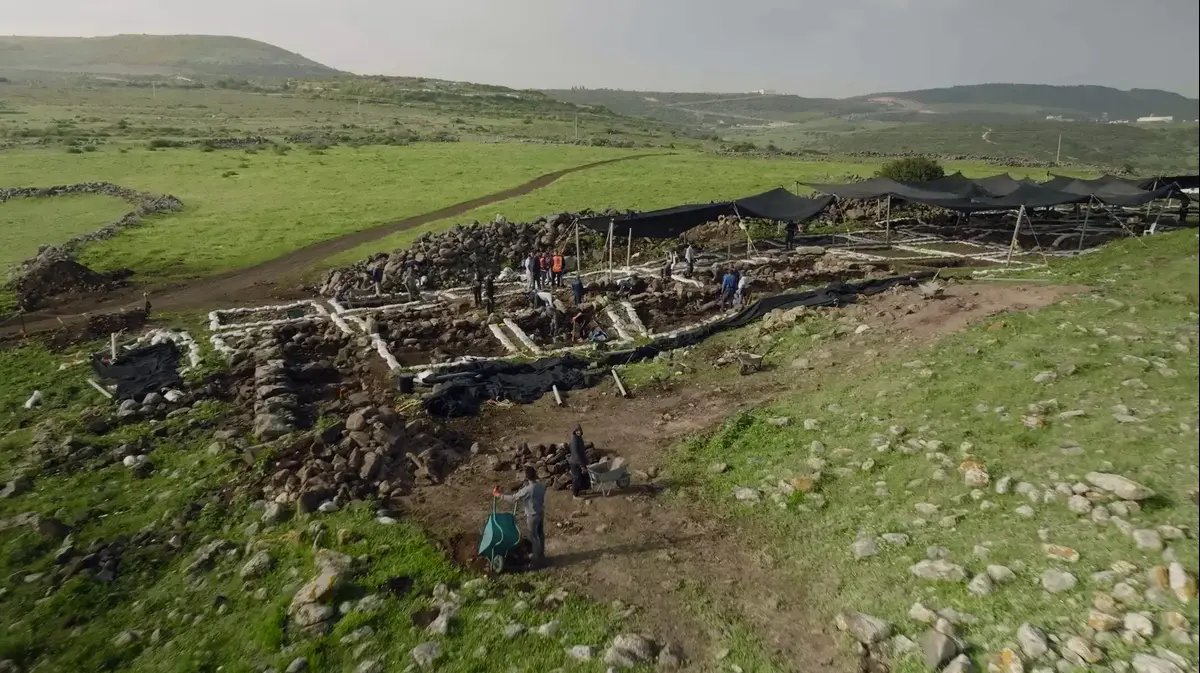A 2,100-year-old agricultural estate was uncovered in the Lower Galilee
"It seems that the estate was hastily abandoned as a result of imminent danger," the researchers say, adding that this is an important discovery, since the known finds from the Hasmonean period in this area in the Galilee are few.
Dozens of agricultural tools, looms for weaving and a cult figurine were also found in it
Ziv Reinstein
25/05/2022
Wednesday, 25 May 2022, 08:33 Updated: 08:49
Share on Facebook
Share on WhatsApp
Share on Twitter
Share on Email
Share on general
Comments
Comments
Horbat Assad, a 2,100-year-old agricultural estate uncovered in Nahal Arbel (Photo: Emil Aljem, Israel Antiquities Authority)
A 2,100-year-old agricultural estate (the Hellenistic period - the Hasmonean period), which was exposed in an impressive state of preservation - and inside objects that appear to have been hastily abandoned, was discovered near Nahal Arbel in the Eastern Galilee.
Archaeological excavations by the Israel Antiquities Authority in favor of the new water transport project funded by Mekorot revealed dozens of loom weights used for weaving cloths, large clay storage vessels, and agricultural tools made of iron, including pickaxes of various sizes, sickle for harvest and more.
In addition, coins dating to the estate for the second half of the 2nd century AD were discovered in the excavation.
The excavation of the antiquities was carried out with the assistance of Mekorot, in order to promote the completion of the water north project.
The project was carried out in accordance with a government decision, at a cost of NIS 910 million, with the aim of flowing desalinated water into the Sea of Galilee in order to preserve the water levels and anchor continuous supply for the needs of households, agriculture and neighboring countries.
More on Walla!
A rare toilet cubicle from the days of the First Temple was discovered in a royal mansion in Jerusalem
To the full article
The farm that was exposed in the Galilee.
Aerial view.
Horbat Assad (Photo: Israel Antiquities Authority, Assaf Peretz)
Excavations at the site (Photo: Israel Antiquities Authority, Emil Aljem)
Iron tools found on the farm (Photo: Israel Antiquities Authority, Dafna Gazit)
Excavations by the Israel Antiquities Authority in a farm building from the Hasmonean period (Photo: Israel Antiquities Authority, Emil Aljem)
According to the director of the excavation, Dr. Amani Abu-Hamid of the Antiquities Authority, "We were lucky enough to discover a capsule of time, as if a queen had stopped: the objects we discovered remained where the site's residents had recently left them, perhaps due to a battle threat;
The loom weights were still lying on the shelf, the storage jars were found intact.
We know from historical sources that in those days the Hasmonean kingdom spread to large areas of the country, and there is a possibility that the abandonment of the estate is related to these events, but this still needs to be investigated in depth.
At this stage, it is difficult to determine the identity of those sitting on the site. "
Abu Hamid adds that "the agricultural estate, which was 30 * 30 square meters, is an important discovery, because the Hellenistic period and the Hasmonean culture are almost unknown in the Galilee.
The discovery closes an archeological gap between periods, and apparently, gives expression to historical events that take place in this area during the 2nd century BC. Little is known about the spread of the Hasmonean kingdom towards the Galilee, and we believe the study of the discovery before us ".
According to Avi Malul, CEO of the Development Division and the customers at Mekorot: "The development work of the Mekorot Company and the Israel Antiquities Authority is carried out in coordination and cooperation from the general planning stage.
The authority's activity on the site was carried out in favor of the strategic project for the transfer of excess water from the desalination facilities in the center of the country towards the north of the country and the Sea of Galilee. "
According to Eli Escozido, director of the Israel Antiquities Authority: "This is an interesting and significant discovery, which was made during an excavation for the purpose of laying the reverse guide line, which is an important project for the Galilee. It will be saved on the site, or it will be copied in full for display nearby. "
The site also revealed foundations of a structure, tools and finds from the beginning of the Kingdom of Israel - 10th-9th centuries BC. All of these will be investigated later.
A figurine from the Hasmonean period in Horbat Assad (Photo: Israel Antiquities Authority, Miri Bar)
A clay candle from the Hasmonean period (Photo: Israel Antiquities Authority, Assaf Peretz)
Weights belonging to a weaving loom (Photo: Israel Antiquities Authority, Miri Bar)
Dr. Amani Abu Hamid at Horbat Assad (Photo: Israel Antiquities Authority, Miri Bar)
Tourism
news
Tags
Israel Antiquities Authority

